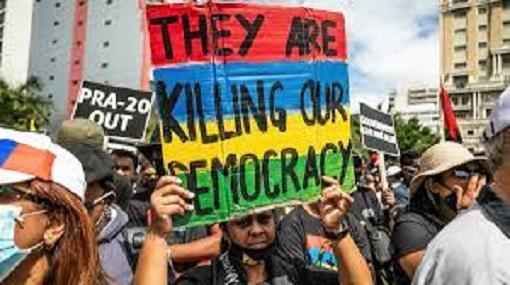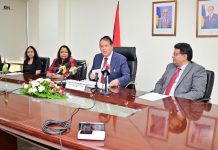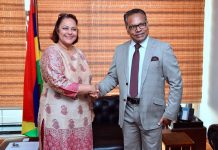Africa-Press – Mauritius. When a former attorney-general and government critic was briefly arrested at his home last May for organising a pro-Palestinian rally — of about 100 people who were said to have contravened Covid measures — the Mauritius Bar Association vigorously protested, calling it “objectionable police practice”.
Likewise, the media and civil society pushed back strongly against a proposal last year by the government’s Information and Communication Technologies Authority to monitor and decrypt all social media content.
The courts, meanwhile, are still hearing petitions against alleged irregularities in the 2019 election that confirmed Pravind Jugnauth as prime minister. Jugnauth assumed the position in 2017, as his father Sir Anerood Jugnauth resigned because of ill health.
The younger Jugnauth’s poll victory in 2019 was built on policies from his first years in office, including the introduction of a minimum wage and the completion of a light railway linking five towns.
But there had been worrying irregularities at the elections, according to Roukaya Kasenally, associate professor at the University of Mauritius. These included, she says, a significant number of people being unable to vote and marked ballot papers found, after voting time, outside counting centres.
Sheila Bunwaree, Mauritius university professor of sociology, contrasts what she sees as judicial foot-dragging in Mauritius with decisive court intervention in Kenya and Malawi, after similar allegations of irregularities.
“I don’t think we can call ourselves a model of democracy any more,” she says. Mauritius is regularly ranked Africa’s most robust democracy by such organisations as the Mo Ibrahim Foundation and Freedom House.
The latter’s freedom index score for Mauritius, of 86, is above South Korea and Poland and just three marks below France. It is regarded by some, however, as a democracy in retreat in terms of room for dissent from the opposition, the media and civil society.
The V-Dem Institute, which aims to measure the quality of democracy, put Mauritius among its “top 10 autocratising countries” in its 2021 rankings. Mauritians, too, are nervous that their cherished democracy is under threat.
An Afrobarometer poll last year showed 45 per cent of respondents as “not very satisfied” or “not at all satisfied” with the state of democracy in the country — compared with 27 per cent in 2012.
Yet their support for the concept of democracy remained among the strongest in Africa, Afrobarometer said. Mauritians “overwhelmingly reject authoritarian alternatives to democratic governance”, with a 95 per cent disapproval rating for one-party rule, higher than in some western democracies.
Mauritius has a history of regular democratic transfers of power since independence and a record of competent policymaking reflected in its impressive — and reasonably egalitarian — economic progress.
Yet, politics has been dominated by two families, the Ramgoolams and the Jugnauths, both from the Indo-Mauritian community that comprises about two-thirds of the population.
In the 54 years since independence, only when Paul Bérenger served from 2003-05 has a prime minister carried a different surname. The younger Jugnauth’s 2017 accession to the top job — as his father passed him the baton without having to hold a general election — earned him the nickname “son of dad”.
Arvin Boolell, a former leader of the opposition Labour party, says power — economic and political — is concentrated in too few hands. Political primacy has bounced between two families and economic clout, particularly land ownership, has remained with a handful of Franco-Mauritian families that comprise about 2 per cent of the population.
Skewed political and economic influence has somehow not led to stark inequality, though. Mauritius’ Gini coefficient, an inequality measure, was 36.8 in 2017 according to the World Bank, better than the US, though signalling that the island was marginally more unequal than the UK.
Many social activists report widening income divisions in recent years. There are perennial complaints that plum public-sector and quasi-public-sector jobs go to those with connections, not the requisite skills and experience.
Nor have some top politicians been free from scandal. Former prime minister Navinchandra Ramgoolam was arrested, though never prosecuted, on suspicion of conspiracy and money laundering, after quantities of cash were found in suitcases in his house during a 2015 police raid.
In the same year, the present prime minister was convicted for a conflict of interest over a property deal. The verdict was overturned on appeal. Bunwaree sees the first-past-the-post electoral system as a problem, making it difficult for minorities to win representation — particularly so-called Mauritian Creoles of African descent, about 28 per cent of the population.
“We have a winner-takes-all syndrome,” Bunwaree says.
“We’ve long been asking for electoral reform with a dose of proportional representation,” she adds, “but that has never happened.”
For More News And Analysis About Mauritius Follow Africa-Press







